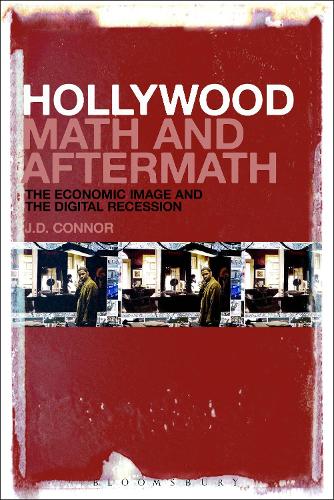
Hollywood Math and Aftermath: The Economic Image and the Digital Recession
(Paperback)
Available Formats
Publishing Details
Hollywood Math and Aftermath: The Economic Image and the Digital Recession
By (Author) Professor J.D. Connor
Bloomsbury Publishing PLC
Bloomsbury Academic USA
20th February 2020
United States
Classifications
Tertiary Education
Non Fiction
Economics
Media, entertainment, information and communication industries
Communications engineering / telecommunications
384.80979494
Physical Properties
Paperback
328
Width 152mm, Height 229mm
440g
Description
Money is Hollywoods great themebut money laundered into something else, something more. Money can be given a particular occasion and career, as box office receipts, casino winnings, tax credits, stock prices, lotteries, inheritances. Or money can become number, and numbers can be anything: pixels, batting averages, votes, likes. Through explorations of all these and more, J.D. Connors Hollywood Math and Aftermath provides a stimulating and original take on the equation of pictures, the relationship between Hollywood and economics since the 1970s. Touched off by an engagement with the work of Gilles Deleuze, Connor demonstrates the centrality of the economic image to Hollywood narrative. More than just a thematic study, this is a conceptual history of the industry that stretches from the dawn of the neoclassical era through the Great Recession and beyond. Along the way, Connor explores new concepts for cinema studies: precession and recession, pervasion and staking, ostension and deritualization. Enlivened by a wealth of case studiesfrom The Big Short and The Wolf of Wall Street to Equity and Blackhat, from Moneyball to 12 Years a Slave, Titanic to Lost, The Exorcist to WALLE, Dj Vu to Upstream Color, Contagion to The Untouchables, Ferris Bueller to Pacific Rim, The Avengers to The VillageHollywood Math and Aftermath is a bravura portrait of the industry coming to terms with its own numerical underpinnings.
Reviews
One of the more original and illuminating explorations of commercial film and television production Connor is as funny as he is smart, and he knows that taking the business of movies seriously will involve some ludicrous scenarios. Reading Aftermath often provides the insider thrill of pulling the curtain back to get a glimpse of how the sausage gets made. * Johns Hopkins Magazine *
This is a rare book that provides an entirely new way of thinking about Hollywood and the equation of pictures. Eloquent and methodologically aware, JD Connor provides deft analysis of the internalized relation of film to money, excavating the economic image of movies and TV shows with killing insight. For anyone seeking yield in the study of media industries and the stories they tell, this book is worth serious investment. * Paul Grainge, Professor of Film and Television Studies, University of Nottingham, UK *
With Hollywood Math and Aftermath, Connor establishes himself as the premier quantum economist of contemporary Hollywood. Bringing film and TV studios financial logic into dialogue with Deleuzian theory and his own imaginative capital through a series of dexterous case studies spanning the past 50 years, Connor gives new meaning to creative accounting, yielding a profitable, balanced account of industry practices, corporate self-inscription and the politics of entertainment finance. * Mark Gallagher, author of Another Steven Soderbergh Experience: Authorship and Contemporary Hollywood (2013), University of Nottingham, UK *
With Hollywood Math and Aftermath, J.D. Connor provides an original, provocative perspective on Conglomerate Hollywoods evolving practices and products. At once historical, philosophical, and industrial in scope, Connor creatively accounts for Hollywoods financial activities in a compelling set of case studies. * Alisa Perren, Associate Professor of Radio-Television-Film, University of Texas at Austin, USA *
Deciding where the numbers end and art begins is a mugs game that writers have been trying to play with Hollywood almost since the birth of cinema itself. J. D. Connors terrifically provocative new book should end this game for once and all. * Los Angeles Review of Books *
Author Bio
J.D. Connor is Associate Professor in the Division of Cinema and Media Studies at the University of Southern California, USA. His research focuses on the interplay of art and industry in the contemporary Hollywood system, the history of tape recording, and Kennedy-era media shifts. Connor is the author of the forthcoming The Studios after the Studios (2015) and on the Steering Committee of Post45 (post45.org).
